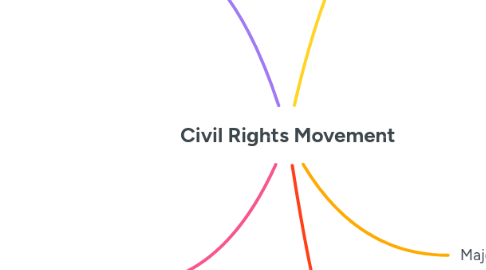
1. Types of discrimination
1.1. Segregation
1.1.1. Legal racial discrimination
1.1.2. Insults
1.1.3. Ban of interracial marriages
1.2. Racist murders
1.2.1. KKK
1.3. Discrimination against black people from the queer community
1.3.1. Still actual
1.4. Assaults
2. Impact on society
2.1. Legal reforms
2.1.1. The legal and voting rights of formely enslaved people
2.2. cultural awareness
2.2.1. Traditions still respected and preserved
2.3. Rosa Parks (against racial segregation)
2.4. political participation
2.4.1. Marthin Luther King (political activist)
2.4.2. Harriet Tubman (political activist)
2.4.3. Malcom X
2.5. global influence
2.5.1. equality and unalienable rights, liberty, and the pursuitof hapiness
2.6. restored
2.6.1. reinforced the rights of citizenship
3. Consequences
3.1. Legal Achievements
3.1.1. Voting Rights Act of 1965: Prohibited racial discrimination in voting.
3.1.2. Civil Rights Act of 1964: Banned segregation in public places and employment discrimination.
3.2. Social and Cultural Change
3.2.1. Greater public awareness of systemic racism.
3.2.2. Inspired other social justice movements
3.2.3. Increased visibility and empowerment of Black Americans.
3.3. End of ségrégation
3.3.1. African American secured access
3.3.1.1. Transportation
3.3.1.2. Restaurants
3.3.1.3. Other public facilities
4. Major events
4.1. Civil Rights Act (1964)
4.1.1. Law that outlawed discrimination
4.1.2. Aimed segragation to end in public
4.1.3. Equal access to public accommmodations
4.2. Voting Rights Act (1965)
4.2.1. eliminate racial discrimination in voting
4.2.2. ban of literacy test, poll taxes
